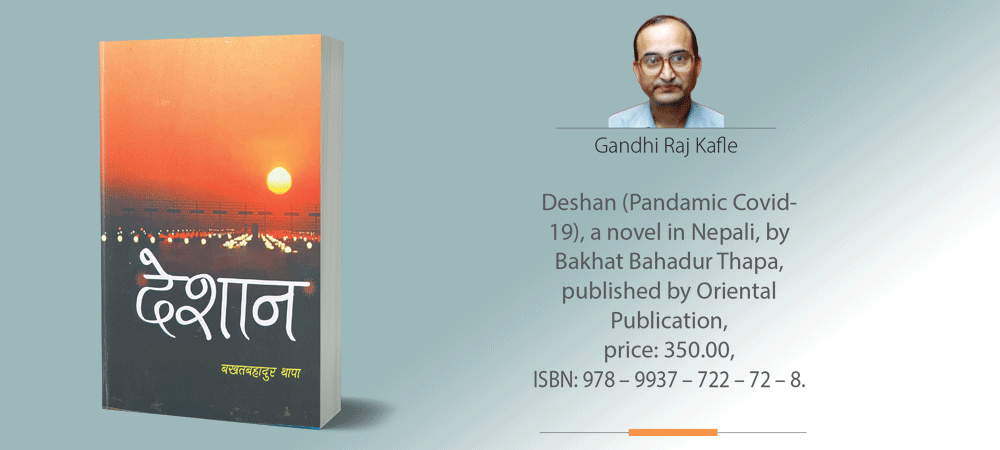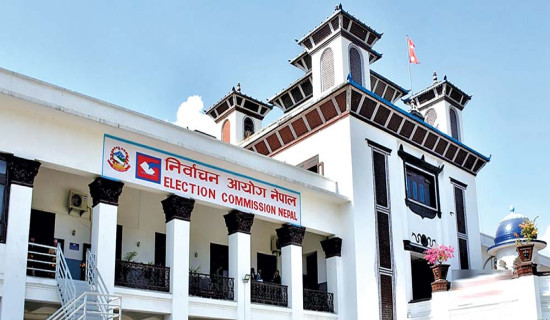- Wednesday, 31 December 2025
Deshan: A Story Of Pandemic-Hit Life
The COVID-19 pandemic, which seems to be receding these days, has already hit the world powerfully. Indeed, with its increasing duration and severity of suffering and casualties, the disease is being discussed and written about everywhere. Such an impact has been seen in literature too, because it is full of creativity with pandemic themes these days.
Meanwhile, the pandemic, COVID-19, is a human interest theme that can be found in every genre of Nepali literature.
Here is an example. This is the publication of the novel "Deshan" by Bakhat Bahadur Thapa.
Many Nepalis of the modern generation may be unfamiliar with the term "Deshan."However, the word is still in use in many of the rural parts of the country. In fact, the Nepali dictionary defines Deshan as pandemic, or a disease that has spread from another country.Thus, the word "Deshan" has become a suitable name for the novel because it focuses on the theme of the COVID-19 pandemic.
Furthermore, novelist Thapa should be thanked for bringing the pure Nepali colloquial word Deshan to the forefront by describing the lives of the COVID-19 times.
Deshan that remained dominant in the psyche of the world spread the same way and hit Nepal, too. The trouble was enormous, and the disease is unavoidable.
According to the plot of the novel, the pandemic was spread by two US returnees named Karan and Karina, who had gone there to further their education.Karina happens to be the daughter of affluent parents, and Karan belongs to a medium-class family. The description of their deep love, however, gets suppressed because both of them become victims of COVID-19, and their separation for treatment ends in tragedy with Karan's death.
What a tragedy! What we expect gets crushed cruelly, and what comes before us to face and tolerate is only the cruelty of circumstances. The demonic subject that played such a horrible role in the past two or three years is none other than COVID-19 itself.
Novelist Thapa has made the Teku Hospital a powerhouse of stories. All the close relatives—father, mother, and even Karina’s boyfriend, Karan—are in this hospital for treatment, but the tragedy in the story is that everyone there hides their identity just to make an ailing family member more relaxed.
Is this expectation met, however?Sometimes the act of love only broadens the wounds of the heart. The pandemic COVID-19 acted in this manner because it brutally destroyed many lives.And the depth of such wounds is immeasurable.
Novelist Thapa has described the impact of COVID-19 the same way: Karina, the principal character in the story, survives. However, she loses almost all of her family members in this battle.After this tragedy, her boyfriend Karan's mother is the only person alive to share her emotions.
Being a novel with the theme of the ongoing crisis of the pandemic, the novelist has many issues to express through his main character, Karina. There are questions and there are answers, too, in this novel.
The questions are: Is it not time to return to nature? Is it right to imitate everything from foreign countries? Should we not now abandon our habit to benefit from fishing in the muddy water? In the context of COVID-19, novelist Thapa has imagined a Guru figure to speak truth.
So, there is explanation in this novel. Some truths have also been told through the character "Uncle," an interesting COVID-19 in-patient who spoke many bitter facts of life to Karina before succumbing to the pandemic at the Teku Hospital.
The diseases, in fact, are indiscriminate. The latest big example of it is the COVID-19, which is equal in attack because it has not spared anyone. But isn't it time to examine humanity through virtues such as kindness, sympathy, cooperation, and decency?Indeed, we expect such virtues, especially during huge crises. But, beyond such expectations in the real world, things often go wrong.
This ideal-reality gap in society is explained in the fraud case in which the main character of this novel, Karina, suffers at the end of the novel.
In conclusion, what can be said is that this novel describes a pandemic's impact on life beautifully.
True, the vision of life's beauty in this creation is broad: it rises from materialism, seeks truth in nature, and attempts to be inquisitive about themes beyond life.Thus, the author's creative efforts during the Pandemic must be commended.

















